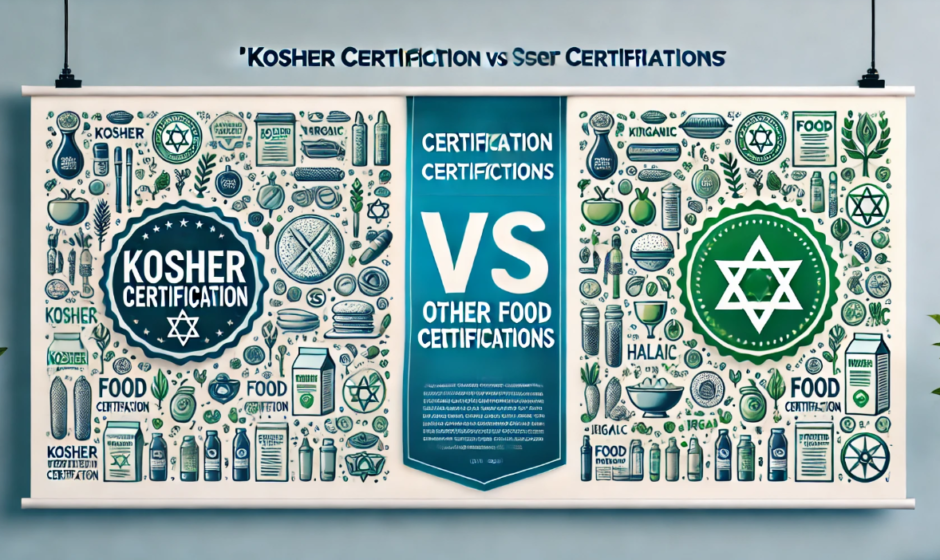What is Kosher Certification?
Kosher certification is a system of standards for Jewish dietary laws, known as kashrut. It governs what foods can be consumed and how they should be prepared, ensuring that products meet specific religious guidelines.
Purpose of Food Certifications
Food certifications aim to guarantee that products adhere to particular quality, safety, and ethical standards, providing assurance to consumers and creating trust in the food industry.
Understanding Kosher Certification
Basics of Kosher Certification
Kosher certification ensures compliance with Jewish dietary laws, including the prohibition of certain ingredients and the use of specific preparation methods. It encompasses everything from ingredient sourcing to facility cleanliness.
Orthodox Kosher Supervision Explained
Orthodox Kosher Supervision (OKS) is a stringent form of Kosher certification overseen by Orthodox Jewish authorities. It involves regular inspections and detailed documentation to ensure adherence to traditional Jewish laws.
Kosher Certification Agency in India
In India, specialized agencies provide Kosher certification, playing a vital role in serving both the Jewish community and businesses interested in this market. These agencies work closely with Orthodox bodies to maintain high standards.
Comparing Kosher Certification with Other Certifications
Halal Certification
Differences Between Kosher and Halal Certification
Halal certification, which follows Islamic dietary laws, shares some similarities with Kosher but differs in its religious requirements. For instance, Halal and Kosher both ban pork, but their slaughtering methods are different.
Similarities and Overlaps
Both Kosher and Halal certifications emphasize cleanliness and humane treatment of animals. Despite differences, they share common goals of ensuring food safety and compliance with religious principles.
Organic Certification
Focus of Organic Certification
Organic certification is centered on farming practices, ensuring that products are grown without synthetic pesticides, GMOs, or artificial fertilizers. It focuses on the environmental impact rather than dietary laws.
Comparing Kosher and Organic Certifications
While Kosher certification deals with religious dietary rules, Organic certification addresses agricultural practices. Products can be both Kosher and Organic, but the certifications cover different aspects of food quality.
ISO Certifications
What ISO Certifications Entail
ISO certifications cover various standards, including quality and safety management. These certifications are internationally recognized and focus on operational aspects rather than specific dietary laws.
Kosher Certification vs. ISO Certifications
ISO certifications ensure businesses meet global standards for quality and safety, while Kosher certification focuses on adherence to Jewish dietary laws. Each serves different purposes within the food industry.
The Role of Kosher Certification in India
Historical Context of Kosher in India
Kosher certification in India has developed over recent years, driven by a growing awareness and demand for Kosher products from Jewish communities and international markets.
Increasing Demand for Kosher Products
The demand for Kosher-certified products in India has risen with the expansion of international trade and the presence of Jewish communities. This has led to a more robust market for Kosher certification services.
Key Players in the Indian Kosher Certification Market
Various agencies in India specialize in Kosher certification, partnering with international bodies to ensure compliance with Orthodox standards and support businesses seeking to enter the Kosher market.
Benefits of Kosher Certification
Advantages for Consumers
For consumers, Kosher certification provides assurance of adherence to Jewish dietary laws and high standards of food safety and quality.
Business Benefits
Businesses gain access to niche markets and demonstrate a commitment to quality and compliance, enhancing their competitive edge.
Cultural and Religious Importance
Kosher certification respects Jewish cultural and religious practices, fostering inclusivity and meeting diverse dietary needs.
Challenges and Considerations
Challenges for Kosher Certification Agencies
Agencies face challenges such as maintaining high standards and managing complex regulations. Consistent oversight and regular inspections are crucial for upholding certification integrity.
Consumer Perceptions and Misconceptions
There are misconceptions about Kosher certification, including misunderstandings about its purpose and quality implications. Educating consumers can help clarify these points.
Conclusion
Kosher certification is distinct due to its specific adherence to Jewish dietary laws and rigorous oversight. While it shares some similarities with other food certifications, its unique aspects make it an important and growing segment of the food industry in India.



